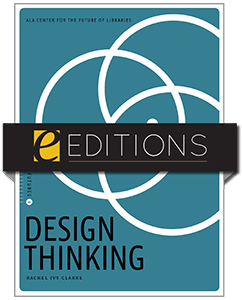
Design Thinking—eEditions e-book
The download link for this product can be found on the final confirmation screen after you complete your purchase, and may also be accessed from your Account Profile. For more information about ALA eEditions file types and how to view them on eReaders, desktop computers, and other devices, see this page.
Primary tabs
You don't need to be an ALA Member to purchase from the ALA Store, but you'll be asked to create an online account/profile during checkout to proceed. This Web Account is for both Members and non-Members. Note that your ALA Member discount will be applied at the final step of the checkout process.
If you are Tax-Exempt, please verify that your account is currently set up as exempt before placing your order, as our new fulfillment center will need current documentation. Learn how to verify here.
- Description
- Table of Contents
- About the author
- Reviews
Series Editor: Miguel A. Figueroa, Director, Center for the Future of Libraries
"Space planning and website design are tasks that result in concrete projects. Design thinking is a mindset, a way of approaching those projects that facilitates creative ideas and helps get at the heart of what those tasks are really trying to accomplish." Read an interview with the author now!
The Library Futures Series continues with this primer on design thinking, broadly defined as an approach to problem solving which prioritizes empathy with and deeper understandings of users to define a problem; actively engages in prototyping to develop solutions; and iterates solutions through implementation and resulting modification. Clarke, a researcher whose work has systematically examined the capacity of design thinking to revolutionize LIS education and the exploration of diverse library reading materials, guides readers through this trend. After introducing the concept, she outlines the steps of the design thinking process model. She then shares various examples of design projects in libraries, illustrating how design thinking extends beyond just space planning or website design and is applicable to all library products and services. She also demonstrates the ways in which design can either enable or stifle such foundational library values as intellectual freedom, diversity, and access. Concluding with a rousing call to action for all librarians to recognize their positions as designers, this book will encourage readers to recognize how design thinking can empower libraries.
Foreword by Miguel A. Figueroa
Understanding Design Thinking
- A Brief History
- The Design Thinking Mindset
- The Design Thinking Process
Design Thinking in Libraries
- User-Centered vs. Human-Centered Approaches
- Working with Constraints
Design Thinking from the Field
- Implicit Applications of Design Thinking
- Explicit Applications of Design Thinking
- Tools and Services to Support Design Thinking
For the Future
- There’s More to Design Than Design Thinking
- From Human-Centered Design to Values-Centered Design
- The Intentional Embrace of Design
Selected Resources
Rachel Ivy Clarke
Rachel Ivy Clarke is currently an assistant professor at the Syracuse University School of Information Studies. Her research focuses on the application of design methodologies and epistemologies to librarianship to facilitate the systematic, purposeful design of library services and library education. Current projects include the IMLS-funded Designing Future Library Leaders project (RE-98-17-0032-17), investigating the integration of design methods and principles in graduate level library education, and the OCLC/ALISE funded project The Critical Catalog, which draws on critical design methodology to provoke the exploration of diverse library reading materials. She holds a BA in creative writing from California State University, Long Beach, an MLIS from San Jose State University, and a PhD from the University of Washington. Her dissertation, which argues that the field of librarianship is more appropriately viewed as a design field rather than a scientific one, received the 2017 iSchools dissertation award and the 2018 ALISE Eugene Garfield dissertation award.
"Will change the way readers think about library administration, how to solve problems, and about design and how it can help librarianship create a better future. This book is highly recommended for library professional collections. It could also help managers in other types of organizations."
— Catholic Library World


